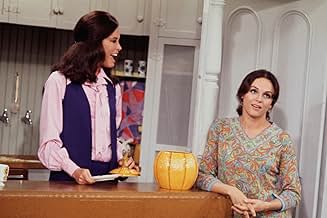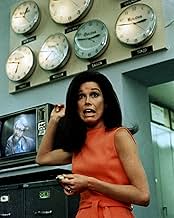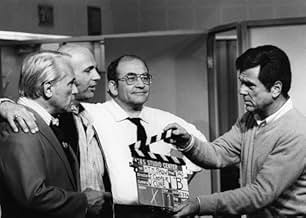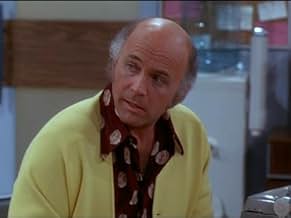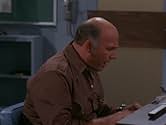Las vidas y las dificultades de una joven soltera y sus amigas, tanto en el trabajo como en el hogar.Las vidas y las dificultades de una joven soltera y sus amigas, tanto en el trabajo como en el hogar.Las vidas y las dificultades de una joven soltera y sus amigas, tanto en el trabajo como en el hogar.
- Ganó 29 premios Primetime Emmy
- 46 premios ganados y 82 nominaciones en total
Explorar episodios
Opiniones destacadas
The backstory: Mary Richards moves to Minneapolis, MN, specifically into an apartment with a sunken in living room. She applies for a job at a local television newsroom with high aspirations. The show not only deals with situation comedy, but with how a woman could "make it after all" in a male dominated workforce. Mary becomes close with her newsroom family, from tough-love boss Lou Grant to bumbling news anchorman Ted Baxter. She also deals with wacky neighbor Phyllis and of course, wise cracking Rhoda. The show is great because you care about all the characters and while funny, it can still deliver a strong message. Truly one of the best shows on television.
Mary Tyler Moore - a great comedic actress & a great long running sitcom. This show was incredible. The writing always seemed to set up funny situations. The pace of the show was just perfect.
Where & how did they get so much talent in one cast? Besides Mary, there is Gavin McCloud who is brilliant as Murray Slaughter. Ed Asner is the same as Lou Grant, Mary's boss. Where did they find Ted Knight? Ted Baxter is one of the great send-up characters of all sit-Com's & Knight played him brilliantly. Knight made it big with this series, went on to his own series, Too Close For Comfort, & also scored big in the original CADDYSHACK.
Then, the is Rhoda & Phyllis who spun from here into their own series. While their series were not as good as this one, they definitely contributed to this one. Let's not forget Betty White as the indomitable Sue Ann Niven. This show was good enough to her, & she played her character brilliantly. This was her springboard for Golden Girls later. She is even better than this.
Not only did Mary turn the world on with her smile, she widened the world a lot by introducing a lot of great character actors in their best career roles. This show could be touching & sentimental at times as well. This show has it all.
Where & how did they get so much talent in one cast? Besides Mary, there is Gavin McCloud who is brilliant as Murray Slaughter. Ed Asner is the same as Lou Grant, Mary's boss. Where did they find Ted Knight? Ted Baxter is one of the great send-up characters of all sit-Com's & Knight played him brilliantly. Knight made it big with this series, went on to his own series, Too Close For Comfort, & also scored big in the original CADDYSHACK.
Then, the is Rhoda & Phyllis who spun from here into their own series. While their series were not as good as this one, they definitely contributed to this one. Let's not forget Betty White as the indomitable Sue Ann Niven. This show was good enough to her, & she played her character brilliantly. This was her springboard for Golden Girls later. She is even better than this.
Not only did Mary turn the world on with her smile, she widened the world a lot by introducing a lot of great character actors in their best career roles. This show could be touching & sentimental at times as well. This show has it all.
It's hard for people to remember what American TV was like at the time (even for people who were alive and conscious then) in the hugely formulaic post-PETTICOAT JUNCTION era.
And I've known a lot of people who today look at the first season of "MTM" where the jokes are broader and don't always quite work and the acting is a bit too "loud" and stagey, and they wonder why this show was so well-regarded, then and now --- often to the point that they can't make it thru to later seasons.
I guess that's understandable. It's hard to believe very-very early episodes of "MTM" about Mary and Rhoda joining a divorce club and its strained humor was actually looser and freer and more amusing than what other sitcoms of the day had to offer. But it's true.
Although the first year of the show may be only sporadically humorous, it makes up for it in that "MTM" did one of the best jobs of capturing that weird melancholy of the era --- that mood that kind of defined the '70s, and was even more intense at the very start of the decade: this sort of lost, disillusioned, bittersweet, post-60s flavor which made everybody immediately seem as if they had a "past" from the moment they appeared on screen...
For anybody looking to see what it actually felt like living in the world at that particular moment in time -- at the cusp of the '60s and '70s -- it's captured vividly by such period montage sequences as the urban street scenes in MIDNIGHT COWBOY (1969) or the snow angels/ice skating sequence in LOVE STORY (1970) or the "MTM" show opening theme design from Season 1, even Mary and little Bess going shopping in a Minneapolis mall, etc...
The world actually felt that way at the time. It's not just a Hollywood construct.
To me, Season 1 of "MTM" is kind of a portal to 1970. I regarded it as such even as early as the late-70s (when the show was first in syndication) and it still hits me the same way whenever I see very early installments--- the look of the show and the forlorn music score... No, the comedy isn't quite as hilarious by the slick standards of sitcoms from more recent decades (or even compared to later episodes of the same show) but I still find the mood almost heart-breakingly captivating. It is so evocative of the era.
As the seasons rolled on, the comedy got sharper (by the standards of the day) even though that '70s somberness was gradually mitigated as it lessened in real life.
So it's a time capsule of sorts... One would think every show and movie filmed in a particular era would be, but that just isn't true. Clothes and cars from a period don't sell or convey the past to the present --- something has to be good, or at least right-minded, in order for the zeitgeist of the era in question to stick to celluloid. And "MTM" was one of those shows that did so.
It was also one of the rare series then to proceed in "real time" which gave the show a life, an energy, that most didn't have, even though it didn't delve into the then-shocking, in-your-face politics that ALL IN THE FAMILY soon would.
Folks who weren't around then probably aren't able to grasp how fresh this "MTM" show seemed back in 1970, given where TV was at the time. Or understand why all the terribly broad (some might even say groan-inducing) comedy directed at, and derived from, Ted Baxter during Season 1 -- which predominantly focused on his dumbness and inability to pronounce basic words -- could possibly ever have been once seen as "funny".
In fact, it was, however briefly, fall-off-the-couch funny. TV in the 1960s had fervently ignored the social changes of that decade (including the questioning of establishment authority) so seeing a revered image like the silver-haired newsreader held up as a buffoon was actually considered edgy, even though that context doesn't really "read" today. (That's not revisionism, I swear. And at least the writers realized they would soon have to write to Ted's narcissism and density in a more layered, sophisticated fashion, and they quickly did so.)
That says more about where the media culture was circa 1969 or 1970 than it does THE MARY TYLER MOORE SHOW.
For all of the above reasons, Mary Richards became metaphorical for the early-to-mid 1970s, almost by accident: TV changed more between 1970 and 1975 than any other five year period in its history, in terms of content, and the television sitcom genre had literally become an agent for social change. And Mary Richards likewise grew during the seven years of the series from the quivery, vulnerable, lanky girl with the long, raven hair who let herself be gently bullied into giving up her family holiday visit at Christmas to cover for her co-workers in that 1970 episode (so wistfully forlorn for reasons hard to explain, except that it, too, captures the poignant atmosphere of the time precisely) into the almost cocky, seasoned professional who didn't pause to deliver a zinger to Ted or SueAnn when circumstances demanded it, and could grab and kiss her latest boyfriend in a public restaurant and then fluff her hair tauntingly at her voyeuristic co-workers as she sauntered out the front door.
Mary had grown up with us, or at least with the television medium, during it's most significant period of progression.
And then there's the actress herself, Mary Tyler Moore, whose own personal melancholia seemed to parallel that of the earlier part of that decade. Even with the same writers and co-stars, the show would never have felt the same without Moore and her intrinsic sense of haunted, detached nostalgia wrapped in winter's chill.
And I've known a lot of people who today look at the first season of "MTM" where the jokes are broader and don't always quite work and the acting is a bit too "loud" and stagey, and they wonder why this show was so well-regarded, then and now --- often to the point that they can't make it thru to later seasons.
I guess that's understandable. It's hard to believe very-very early episodes of "MTM" about Mary and Rhoda joining a divorce club and its strained humor was actually looser and freer and more amusing than what other sitcoms of the day had to offer. But it's true.
Although the first year of the show may be only sporadically humorous, it makes up for it in that "MTM" did one of the best jobs of capturing that weird melancholy of the era --- that mood that kind of defined the '70s, and was even more intense at the very start of the decade: this sort of lost, disillusioned, bittersweet, post-60s flavor which made everybody immediately seem as if they had a "past" from the moment they appeared on screen...
For anybody looking to see what it actually felt like living in the world at that particular moment in time -- at the cusp of the '60s and '70s -- it's captured vividly by such period montage sequences as the urban street scenes in MIDNIGHT COWBOY (1969) or the snow angels/ice skating sequence in LOVE STORY (1970) or the "MTM" show opening theme design from Season 1, even Mary and little Bess going shopping in a Minneapolis mall, etc...
The world actually felt that way at the time. It's not just a Hollywood construct.
To me, Season 1 of "MTM" is kind of a portal to 1970. I regarded it as such even as early as the late-70s (when the show was first in syndication) and it still hits me the same way whenever I see very early installments--- the look of the show and the forlorn music score... No, the comedy isn't quite as hilarious by the slick standards of sitcoms from more recent decades (or even compared to later episodes of the same show) but I still find the mood almost heart-breakingly captivating. It is so evocative of the era.
As the seasons rolled on, the comedy got sharper (by the standards of the day) even though that '70s somberness was gradually mitigated as it lessened in real life.
So it's a time capsule of sorts... One would think every show and movie filmed in a particular era would be, but that just isn't true. Clothes and cars from a period don't sell or convey the past to the present --- something has to be good, or at least right-minded, in order for the zeitgeist of the era in question to stick to celluloid. And "MTM" was one of those shows that did so.
It was also one of the rare series then to proceed in "real time" which gave the show a life, an energy, that most didn't have, even though it didn't delve into the then-shocking, in-your-face politics that ALL IN THE FAMILY soon would.
Folks who weren't around then probably aren't able to grasp how fresh this "MTM" show seemed back in 1970, given where TV was at the time. Or understand why all the terribly broad (some might even say groan-inducing) comedy directed at, and derived from, Ted Baxter during Season 1 -- which predominantly focused on his dumbness and inability to pronounce basic words -- could possibly ever have been once seen as "funny".
In fact, it was, however briefly, fall-off-the-couch funny. TV in the 1960s had fervently ignored the social changes of that decade (including the questioning of establishment authority) so seeing a revered image like the silver-haired newsreader held up as a buffoon was actually considered edgy, even though that context doesn't really "read" today. (That's not revisionism, I swear. And at least the writers realized they would soon have to write to Ted's narcissism and density in a more layered, sophisticated fashion, and they quickly did so.)
That says more about where the media culture was circa 1969 or 1970 than it does THE MARY TYLER MOORE SHOW.
For all of the above reasons, Mary Richards became metaphorical for the early-to-mid 1970s, almost by accident: TV changed more between 1970 and 1975 than any other five year period in its history, in terms of content, and the television sitcom genre had literally become an agent for social change. And Mary Richards likewise grew during the seven years of the series from the quivery, vulnerable, lanky girl with the long, raven hair who let herself be gently bullied into giving up her family holiday visit at Christmas to cover for her co-workers in that 1970 episode (so wistfully forlorn for reasons hard to explain, except that it, too, captures the poignant atmosphere of the time precisely) into the almost cocky, seasoned professional who didn't pause to deliver a zinger to Ted or SueAnn when circumstances demanded it, and could grab and kiss her latest boyfriend in a public restaurant and then fluff her hair tauntingly at her voyeuristic co-workers as she sauntered out the front door.
Mary had grown up with us, or at least with the television medium, during it's most significant period of progression.
And then there's the actress herself, Mary Tyler Moore, whose own personal melancholia seemed to parallel that of the earlier part of that decade. Even with the same writers and co-stars, the show would never have felt the same without Moore and her intrinsic sense of haunted, detached nostalgia wrapped in winter's chill.
As a 25-year-old woman, it's a shame that the so-called "feminist icons" of my day have been klutzy, man-hungry ninny Ally McBeal and tabloid wench Paris Hilton. I've really come to envy women who had real feminist heroes, real or fictional, such as Gloria Steinem, Bea Arthur as "Maude", and, of course, Mary Tyler Moore as Mary Richards. "The Mary Tyler Moore Show" isn't just an excellent sitcom with perfectly realized characters, but it featured an imperfect but winning heroine that any woman could look up to. Mary was a sweet-natured thirty-something who alternated between being high-strung and confident. She happily lived alone and had a loyal gal pal in smart mouthed New Yorker Rhoda (the incomparable Valerie Harper). Mary also was an associate TV producer at the low-rated WJM news network, where she had the respect of her male co-workers, including her arch-conservative boss Lou Grant (Ed Asner), wisecracking but tender-hearted work buddy Murray Slaugher (Gavin McLeod), and buffoonish anchorman Ted Baxter (Ted Knight). Not that everyone loved Mary... she constantly had to deal with her insufferable, overbearingly perky landlady Phyllis (Cloris Leachman). When Phyllis was written out of the show, WJM's "Happy Homemaker" Sue Ann Nivens (flawless Betty White) replaced her as Mary's foil. Passive-aggressive and sex-starved, Sue Ann was a hilarious combination of Blanche from "The Golden Girls" and Harriet Nelson. Best of all, the show had running gags that somehow never went stale: Mary's tendency to attract the wrong men, her disastrous dinner parties, Ted's slips of the tongue on the air, Lou's annoyance at being the lowest-rated TV network, and Rhoda's quest for the perfect husband. An addictive show that didn't wear out its welcome in its seven year run, "MTM" is a shining example of great writing, fully developed characters, and perfect casting that has never been equaled. It was a show with spunk... we need spunk!
For the longest period of time, I couldn't understand the appeal of "The Mary Tyler Moore Show". Having caught the occasional episode every now and then, the series struck me as being somewhat "ordinary" in nature. However, at the beginning of 2002, I began to watch the series on a regular basis, right from it's first season and found to my surprise, what a funny, insightful and entertaining sitcom it was.
Mary Tyler Moore deserves kudos for her portrayal of Mary Richards, a ground-breaking character who was allowed to be her own person (a rare thing for female characters on television in those days). An intelligent, independent young woman in her 30's, whose wasn't "hung up" on not being married, and enjoyed her life and her career. The rest of the cast also deserve mention for their memorable performances. Ed Asner as the gruff, yet lovable Lou Grant (Mary's boss at WJM-TV), Valerie Harper as the sharp and sassy Rhoda Morgenstern (Mary's best friend and next door neighbour), Gavin Macloud as the witty & thoughtful Murray Slaughter (Mary's fellow work mate at WJM), the late Ted Knight as the self absorbed and talentless Ted Baxter (who "anchored" the news in more ways than one at WJM-TV) and Cloris Leachman as the flighty and somewhat over-opininated Phyllis Lindstorm (Mary's other next door neighbour and friend).
The show was fortunate enough to benefit from first rate scripts from talented writers such as Jim Brooks & Allan Burns (both of whom created the series), Treva Silverman, David Lloyd, Bob Ellison and Ed Weinberger.
Along with solid direction from vetran TV sitcom director Jay Sandrich (of "I Love Lucy" fame), it comes as no surprise that the series was both a critical and commerical success during it's seven year run on US television from 1970 to 1977. The show also benefited from later additions to the cast such as Georgia Engel as the sweet natured, yet rather naive Georgette Franklin (who was introduced into the series as a love interest for the idiotic Ted Baxter) and Betty White as the conniving & man-hungry Sue Ann Nivens (host of "The Happy Homemaker" show at WJM-TV). On screen, she is the image of domestic knowledge and bliss, but once the camera's have stopped rolling, she is a woman on the prowl, striking at any man within distance (single or otherwise) who grabs her fancy!!. Earning a whole swag of Emmy Awards, the show was highly praised and rewarded for it's stellar efforts. I recommended those who are unfamiliar with the show to watch the series from the beginning, to appreciate and understand the nature of what it's all about. The humour is natural and witty (unlike many other sitcoms where the laughs are either forced or over-the-top). The characters grow and change over the years (once again unlike many other comedy shows), and the series itself contains it's own warmth and natural charm. Check it out and see why this lady can still turn the whole world on with that smile ...
Mary Tyler Moore deserves kudos for her portrayal of Mary Richards, a ground-breaking character who was allowed to be her own person (a rare thing for female characters on television in those days). An intelligent, independent young woman in her 30's, whose wasn't "hung up" on not being married, and enjoyed her life and her career. The rest of the cast also deserve mention for their memorable performances. Ed Asner as the gruff, yet lovable Lou Grant (Mary's boss at WJM-TV), Valerie Harper as the sharp and sassy Rhoda Morgenstern (Mary's best friend and next door neighbour), Gavin Macloud as the witty & thoughtful Murray Slaughter (Mary's fellow work mate at WJM), the late Ted Knight as the self absorbed and talentless Ted Baxter (who "anchored" the news in more ways than one at WJM-TV) and Cloris Leachman as the flighty and somewhat over-opininated Phyllis Lindstorm (Mary's other next door neighbour and friend).
The show was fortunate enough to benefit from first rate scripts from talented writers such as Jim Brooks & Allan Burns (both of whom created the series), Treva Silverman, David Lloyd, Bob Ellison and Ed Weinberger.
Along with solid direction from vetran TV sitcom director Jay Sandrich (of "I Love Lucy" fame), it comes as no surprise that the series was both a critical and commerical success during it's seven year run on US television from 1970 to 1977. The show also benefited from later additions to the cast such as Georgia Engel as the sweet natured, yet rather naive Georgette Franklin (who was introduced into the series as a love interest for the idiotic Ted Baxter) and Betty White as the conniving & man-hungry Sue Ann Nivens (host of "The Happy Homemaker" show at WJM-TV). On screen, she is the image of domestic knowledge and bliss, but once the camera's have stopped rolling, she is a woman on the prowl, striking at any man within distance (single or otherwise) who grabs her fancy!!. Earning a whole swag of Emmy Awards, the show was highly praised and rewarded for it's stellar efforts. I recommended those who are unfamiliar with the show to watch the series from the beginning, to appreciate and understand the nature of what it's all about. The humour is natural and witty (unlike many other sitcoms where the laughs are either forced or over-the-top). The characters grow and change over the years (once again unlike many other comedy shows), and the series itself contains it's own warmth and natural charm. Check it out and see why this lady can still turn the whole world on with that smile ...
¿Sabías que…?
- TriviaProducers wanted "someone like Betty White" to play Sue Ann Nivens. Eventually, someone asked, "Why not cast Betty White?"
- ErroresIn the first season installment "Divorce Isn't Everything", Mary mentions that she can't speak French but can speak Spanish. Later in the series, while at a Mexican restaurant, she indicates that she can't read the menu because she took French in college.
- Citas
Lou Grant: You know, Mary, you've got spunk.
Mary Richards: Why, thank you, Mr. Grant.
Lou Grant: I hate spunk.
- Créditos curiososIn episode 71 the MTM Kitten was replaced by Miss Moore herself, saying "Th-th-th-that's all folks!", a line spoken by Mary Richards during that episode.
- ConexionesFeatured in The 23rd Annual Primetime Emmy Awards (1971)
Selecciones populares
Inicia sesión para calificar y agrega a la lista de videos para obtener recomendaciones personalizadas
- How many seasons does The Mary Tyler Moore Show have?Con tecnología de Alexa
Detalles
- Tiempo de ejecución30 minutos
- Color
- Relación de aspecto
- 4:3
Contribuir a esta página
Sugiere una edición o agrega el contenido que falta

Principales brechas de datos
By what name was Mary Tyler Moore (1970) officially released in India in Hindi?
Responda





